State allowed drug-stealing nurse to keep practicing
State allowed drug-stealing nurse to keep practicing
A drug-addicted nurse caught stealing medications twice is allowed to keep her license for nearly four years.
WILLIAMS BAY, Wis. - A drug-addicted nurse is caught stealing pain pills meant for patients -- first in Beloit, then in Williams Bay. Nearly four years later, we found her still working (and still fully licensed) at a nursing home in Janesville. Now, the Wisconsin Department of Safety and Professional Services (DSPS) is proposing changes because of what the FOX6 Investigators uncovered.
For nearly a year, health care workers across the state have been greeted at work by signs that remind them they are the heroes of the COVID-19 pandemic. They risk their lives to treat patients infected with a potentially deadly virus. But like those in any line of work, nurses sometimes battle another demon -- substance abuse -- and that can put patients at risk.
One such addict is Amanda Nieuwenhuis, a 33-year-old registered nurse who lives in Darien. When FOX6 Investigator Bryan Polcyn approached her as she finished a cigarette on her front porch, she lied to him.
"Are you Amanda?" Polcyn asked.
"No," she replied.
"Can you tell me where she is?" he asked.
"I don’t know," she countered, before walking back inside the house and closing the front door.
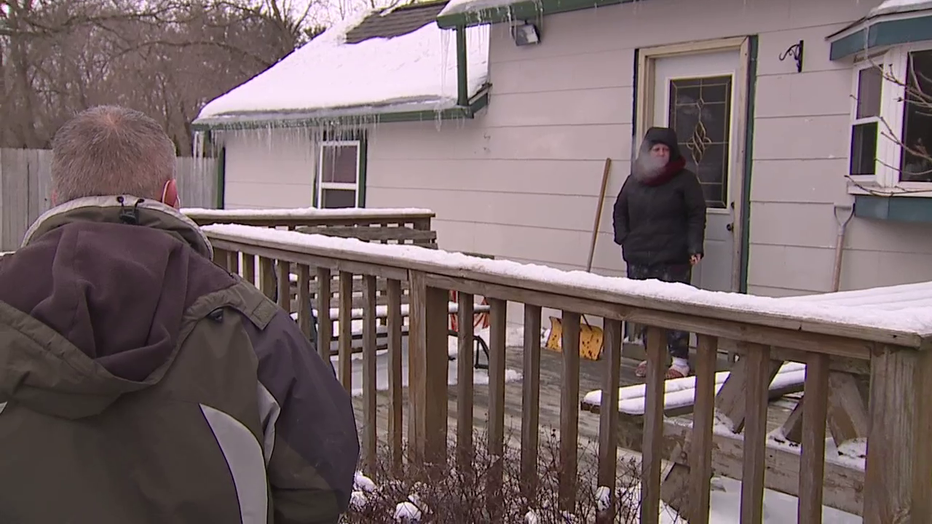
FOX6 Investigator Bryan Polcyn tries to talk to Nieuwenhuis outside her home in Darien, WI.
Minutes later, Nieuwenhuis responded to a text message, writing, "I am willing to speak with you about this after I speak with my lawyer." She later canceled two phone appointments and stopped responding prior to a third.
"She is a danger to the public," said Arthur Thexton, a retired DSPS prosecutor who agreed to talk about the case after reviewing files provided by FOX6 News.
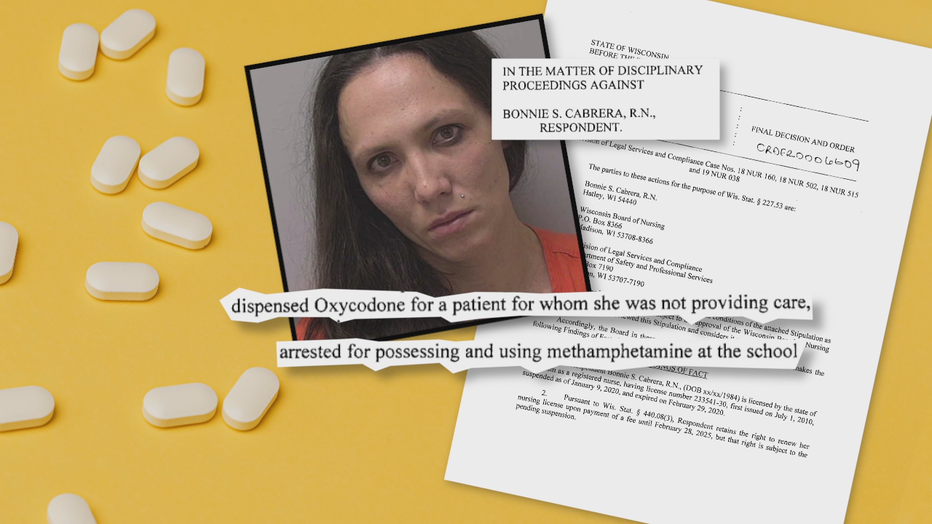
Bonnie Cabrera
Nieuwenhuis is one of more than 50 Wisconsin nurses -- including registered nurses, licensed practical nurses and advanced practice nurse prescribers -- disciplined in just the past year for taking drugs intended for patients. Among them is Bonnie Cabrera, who was accused of stealing pain pills at a Wausau hospital; then later of bringing crystal meth into a public school. Jere Daniels was caught twice diverting morphine sulfate tablets and tramadol in Appleton. And Cherie Jess was caught three times -- in 2017, 2018 and 2019 -- diverting medications in Madison and Waukesha.
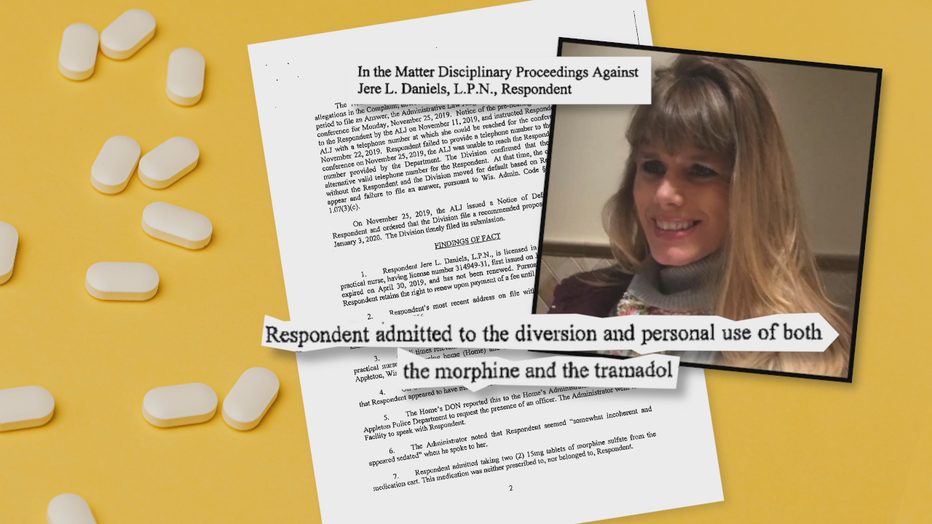
Jere Daniels
"It is alarming and it is concerning," says Dr. Sean Leroue, a psychiatrist with Rogers Behavioral Health. "We know that, especially now in this pandemic, health care providers, in particular, are under tremendous amounts of stress."
And that's why Tom Knight says those who've been disciplined are just the tip of the iceberg.
"Yeah, that’s the metaphor I’d use," he said.
Knight is the founder of HealthcareDiversion.org, a 501(c)3 nonprofit created to raise awareness of a problem he says is much larger than most people realize.
"It's hard to know precisely how big because most cases of diversion are not detected," he said.
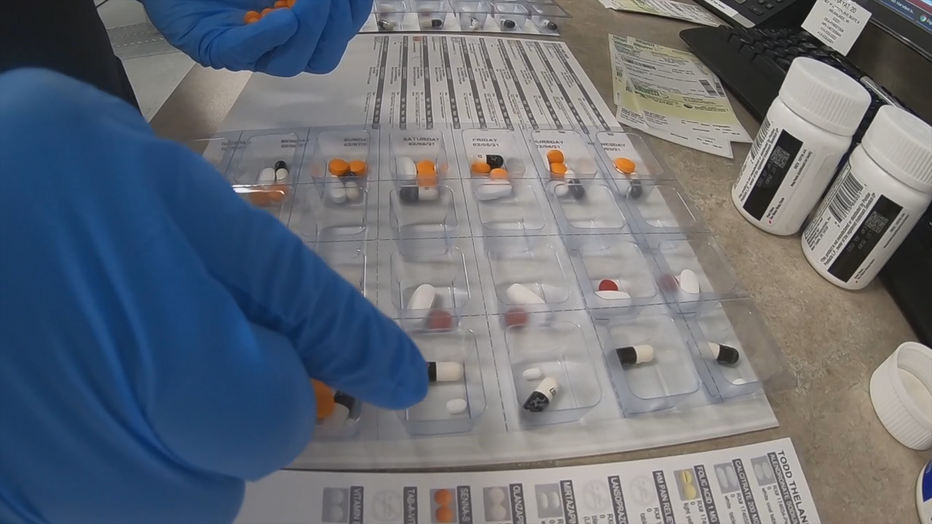
A report by the federal Substance Abuse and Mental Health Services Administration (SAMHSA) in 2015 found 5.7% of health care workers admit to having a substance abuse disorder. That's less than the general population. However, with more than 110,000 active, licensed RNs, LPNs and APNPs in Wisconsin, that would equate to more than 6,200 nurses who are addicted to alcohol or drugs.
"They’re people and they’re subject to illnesses in their hearts, in their lungs, in their livers and in their brains," said Dr. Mike Miller, an addiction psychiatrist and advisor to the Wisconsin Medical Society.
The problem, according to Dr. Miller, is that most don't seek treatment until they get in trouble. Even then, it can take years for the disciplinary process to play out.
"The work that the boards do is excellent," he said. "But there is an issue with timeliness."
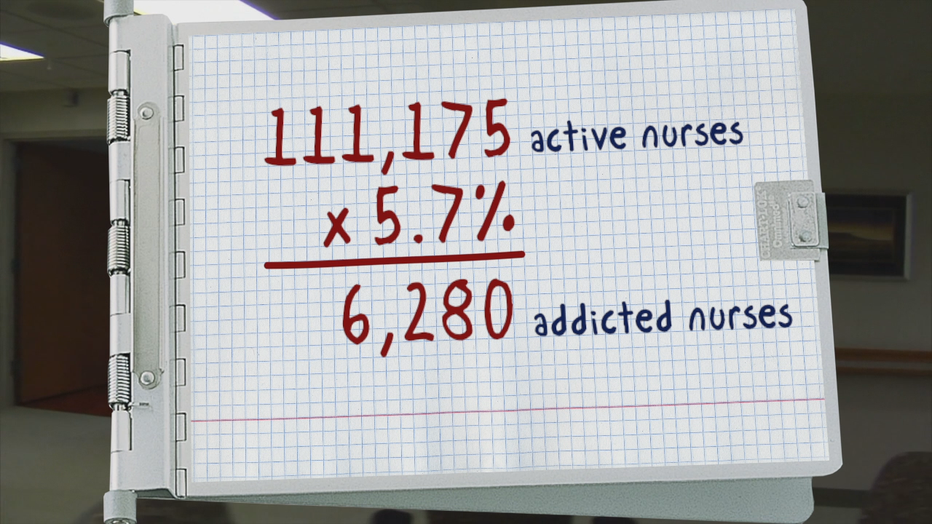
Still, what happened with Nieuwenhuis is so extreme, the state is already promising to "improve the operation of the division that handles disciplinary proceedings."
"In no way was this case handled, in my opinion, the way this case should have been handled," said Thexton, who became disillusioned with the operations of DSPS before he retired in 2015. "Morale was poor. Many of us left. That’s when I chose to retire, and the replacements lacked experience."
A DSPS spokesperson now blames "staff turnover" during Governor Scott Walker's administration for at least some of the delay in prosecuting Nieuwenhuis, even though more than half of the investigation (and accompanying delays) occurred under Governor Tony Evers.
"In my opinion, this case was mishandled, even after new administration took over," Thexton said.
FREE DOWNLOAD: Get breaking news alerts in the FOX6 News app for iOS or Android
It started in March 2017, when Nieuwenhuis was an assistant director of nursing at Beloit Health and Rehabilitation. She signed out six tablets of oxycodone for a patient, but only two were returned. The patient stated that she did not ingest any of the medication. The nursing home required Nieuwenhuis to submit to a urine drug screen, which came back positive for three different opioids. She could not provide a valid prescription for any of them, so she was fired.
"This case should have been immediately a high-priority case," Thexton said.
But records obtained by the FOX6 Investigators show DSPS failed to treat it as a priority. A department investigator spent a total of 25 minutes working on the case in 2017, while a prosecuting attorney billed 1 hour and 45 minutes. Other DSPS employees picked up the case in 2018, but it went nowhere for more than a year-and-a-half. That's when Nieuwenhuis struck again, at Atrium Health in Williams Bay.
"And more people ended up being harmed at her hands," said Regan Thurow, whose grandmother, Ayn Huffman, was one of the people harmed. "My grandmother was extremely vulnerable."
In November 2018, a report written by a Williams Bay police officer indicates that medications for two different patients went missing. Both occurred on Nieuwenhuis's shift. The missing meds include 29 pills of Norco (hydrocodone) meant for a male patient and three pills of oxycodone intended for Huffman -- pills she never received.
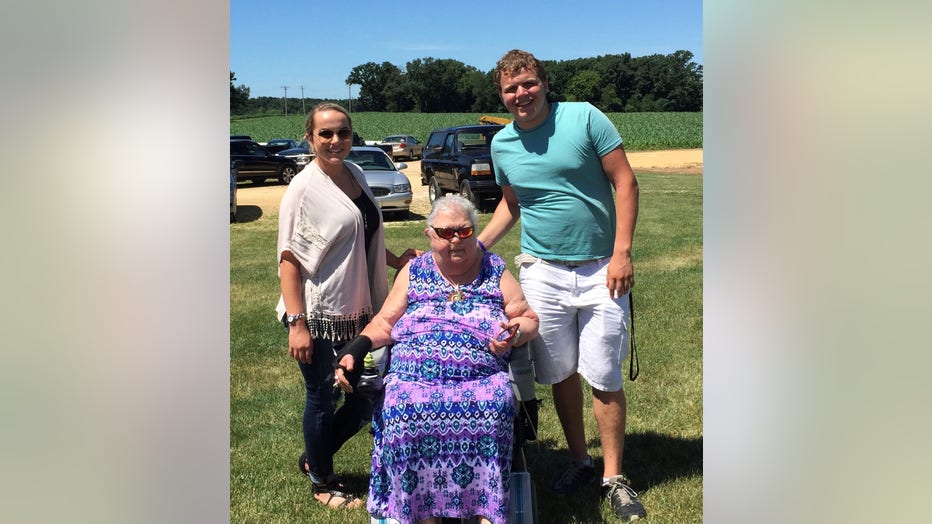
Ayn Huffman (center) was a resident of Atrium Health in Williams Bay in 2018 when Nieuwenhuis was suspected of diverting her pain medication. Huffman died in 2019.
"I'm sure she was wondering why she was in so much pain," Thurow said.
After the second case surfaced, prosecutors could have sought an immediate suspension of Nieuwenhuis's nursing license while the investigation proceeded. It's an action known as "summary suspension."
"When should the department seek summary suspension?" Polcyn asked.
"When a practitioner is a clear and present danger to the public," Thexton answered.
"And this nurse, you believe, at that point, was clearly a danger to the public?" Polcyn followed.
"Obviously," he said.
But DSPS did not even attempt to get the Board of Nursing to approve a summary suspension.
"That was a complete failure of management," Thexton said.
"The lack of discipline is shocking," Thurow said.
DSPS largely blames the next two years of delays on Nieuwenhuis, who either took the "maximum amount of time to respond to department communications" or "missed deadlines altogether."
"The way to get them to respond to you is to suspend them! Now they have incentive to cooperate," Thexton said.
Instead, Nieuwenhuis kept stringing investigators along and kept working.
In December, we found her reporting to work at St. Elizabeth nursing home in Janesville. Nursing Home Administrator Casey Schuett said he was "shocked" to learn of the allegations against Nieuwenhuis. In an email to FOX6 News, he says the nursing home performed an "extensive background check," including a review of her license status on the DSPS website, but found no red flags. That's because the state does not mention pending investigations in its license lookup database, and Schuett says Nieuwenhuis did not include the nursing homes that fired her on her resume. Schuett says they hired her in mid-November and, after learning of her license suspension, fired her earlier in January.
"How many more people has she harmed in the last three years?" Thurow asked.
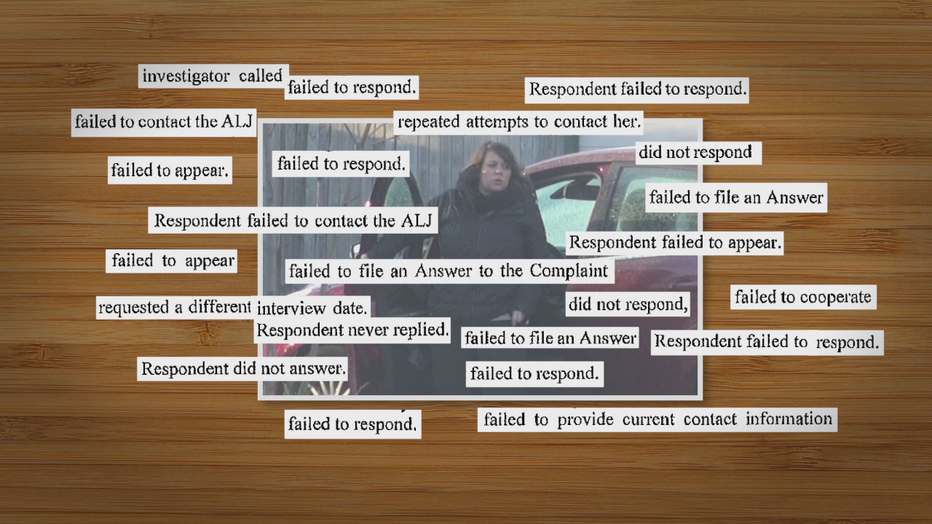
There is no evidence Nieuwenhuis has diverted any additional medications since 2018, but on Jan. 14, 2021, the Wisconsin Board of Nursing voted to suspend her license indefinitely. She can petition for reinstatement after at least 90 days have passed, but not until she can provide evidence that she is being treated for drug addiction and submitting to weekly drug screens. If she returns to work, she will have to be monitored by an addiction professional who will report to the board four times per year.
"The safest health professional is one who is in monitoring," said Dr. Miller.
He says treatment should be the goal, not punishment.
"Physicians and nurses with addiction are sick," he said. "They’re not bad people."
But Thexton points out there is a difference between drug addiction and drug diversion.
"She basically stole somebody else’s property," he said.
And that, he says, calls for swift discipline.
"She’s not fit to be at the hands of somebody else who needs care," Thurow said.
For patients and their families, anything less could be a tough pill to swallow.
In an email to FOX6 News, the communications director for DSPS, Jennifer Garrett, wrote that when the second case surfaced in 2018, the case was being handled by employees who are no longer with the division of enforcement.
"We have no way of knowing their thought processes and decision making other than what is contained in the file," Garrett said.
In a separate email, she said the department "would not handle the case this way today," calling it an "unfortunate reminder" that the work DSPS has been doing to "stabilize the division" under Secretary Dawn Crim is "far from finished."
Read the full text of three emails sent by DSPS to FOX6 News here:
Email #1
"A few factors affected this case. Soon after the initial complaint was filed, the department experienced staff turnover in the division that handles prosecutions. A case hand-off almost inevitably slows proceedings, as it takes time for new staff to familiarize themselves with a case. We recognize this is not an ideal scenario, and both Governor Evers and Secretary Crim understand that staff turnover affects operations. That is why Governor Evers issued his first two executive orders recognizing the value of state employees, and that is why Secretary Crim has been working within the agency for the past two years to identify tangible ways to improve the work environment. Staff retention matters and this case is a good example of why it matters and why this administration is prioritizing it.
Also, during the handling of the initial complaint, a second complaint was filed. The prosecutor combined the two cases. This is standard procedure, but it does also contribute to the appearance of delay. Yet second case often yields evidence and insight that ultimately influence the disposition of the first case. It is impractical to separately prosecute two closely related cases, and, again, it is standard practice to combine them. Additionally, the respondent either took the maximum amount of time to respond to department
communication or she missed deadlines altogether. Cases can move much more quickly when individuals or their attorneys respond within allotted timeframes. Cases also move more quickly when the state and the respondent agree to resolve the case short of forcing the department to file a formal complaint with the DOA Division of Hearings and Appeals. This requires the case to go through a hearing (trial process) before an administrative law judge.
In this case, an agreement could not be reached and the department filed a formal complaint. The judge ultimately issues a Proposed Decision and Order (PDO), and that PDO was adopted by the Board of Nursing. The department recognizes that drug diversion is part of the much larger opioid epidemic in the state. We work closely with other agencies and the administration on multi-faceted public health interventions. Individual case prosecutions are certainly a part of that, as is the Professional Assistance Procedure (PAP). Also critical is our administration of the Enhanced Prescription Drug Monitoring Program. The PDMP is a database that logs opioid, benzodiazepine, and stimulant prescriptions and puts that information at prescribers’ fingertips as they make decisions about painkillers for patients. The PDMP has transformed prescriber culture. Specifically, it has virtually eliminated the practice of doctor shopping. The department also presents an annual law enforcement hearing at a Controlled Substances Board meeting. Members of the law enforcement community are invited to share what they see in their work so that the CSB can make scheduling decisions based on what is happening in different parts of the state."
Email #2
- When the second diversion case surfaced in 2018, did the department seek summary suspension? If not, why not?
"The records do not indicate that the department sought summary suspension. At that time, the case was being handled by employees who are no longer with the division. We have no way of knowing their thought processes and decision making other than what is contained in the case file. It is entirely possible that current staff would have handled this case differently at the outset."
- How many separate cases of alleged diversion would typically warrant a filing for summary suspension?
"There is no specific number. Prosecutors exercise their legal judgment and make decisions based on established law and
the facts of the case at hand."
- Your statement indicates this respondent took "the maximum amount of time" to respond, missed deadlines and refused to agree to resolve the case through stipulation. Because of that, she was able to continue practicing unencumbered by treatment regimens, urine screens and monitoring requirements. Does that incentivize a respondent to intentionally stall?
"Using all of time legally allowed is different from missing deadlines. Prosecutors do have some discretion to grant
extensions and do so when they believe circumstances warrant it. They work with license holders in good faith and
presume that license holders are affording us that same respect. Sometimes that is not case."
- Finally, the Affidavit of Costs for Case Number 17NUR346 includes just 3 entries for 2017 – 6/15/2017, 10/2/2017, and 10/11/2017 – filed by Investigator Kylie Pace. Those three entries total 25 minutes billed. Would it be accurate for me to say, then, that the department spent a total of 25 minutes in 2017 investigating the first case of diversion?
"It would appear so. Under current leadership, any time spent on a case must be logged."
Email #3
"We would not handle this case this way today. For the past two years, we have been working to improve operations in the division that handles disciplinary proceedings. We will continue to evaluate processes and make the changes necessary to ensure current and future cases are handled in a way that meets our expectations and protects public safety. This case is an unfortunate reminder that the work we have been doing to stabilize that division is far from finished and must continue."

